Our 10 Favorite Watch Posts Of The Year#
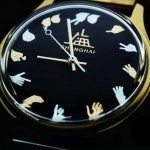
Creative agency Jellymon's Collab with Shanghai Watch
Shanghai Watch Looks To Join Ranks Of Elite Brands (February 11)
Although most of the world’s top watchmakers remain cozily ensconced within the borders of Switzerland, as with most luxury industries “the Chinese are coming”…in this case, to reinvent a brand better known for gracing the wrists of Mao Zedong and Zhou En’lai than Donald Trump or Warren Buffett. (Though the latter might be more open to it than we might assume.) This brand,Shanghai Watch (上海手表厂), started producing watches in the mid-1950s, amid a flurry of activity in the Shanghai wristwatch industry, and quickly established itself as the country’s top watchmaker.
Over the course of the past 30 years, Chinese watchmakers have struggled to rival foreign brands at the high end, and not one has seriously been able to compete with Rolex, Omega, Blancpain, Chopard or Vacheron Constantin. However, a couple of years ago a once-unlikely contender seemingly came out of nowhere, intent on reinventing its brand and creating a real Chinese luxury wristwatch: Shanghai Watch.
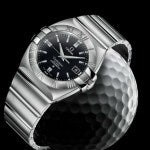
The Omega Constellation was the #1 watch in China
Swiss Watchmakers “Pin Sights” On China, Asia: FT (March 19)
For decades, the wristwatch has held particular value in China. First, in the first 30 years after the revolution as a sort of “pragmatic luxury,” exemplified by the watches typically given as wedding gifts to young couples and the Shanghai watches seen adorning the wrists of leaders like Mao Zedong and Zhou En’lai, then — since 1979 — as a “true luxury.” As many watchmakers have noted through the years, the first major luxury purchase for many of China’s newly rich is a Swiss watch.
The symbolism of an extravagant Swiss watch has not been lost in the China of the post-Deng Xiaoping economic reforms, during which millions of Chinese have, for the first time, made their fortunes and quickly made their country the world’s second-largest luxury market. Swiss watchmakers have, for their part, been quick to notice this.
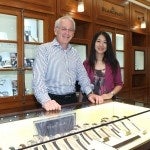
Watch expert Jeffrey Kingston and Blancpain Hong Kong VP Sincere Chiu
Swiss Watchmaker Blancpain Educates VIPs In Hong Kong (June 11)
Swiss watchmaker Blancpain held a VIP event in Hong Kong, in which a group of invited guests were treated to a workshop led by well-known watch critic and expert Jeffrey Kingston and Alain Delamuraz, Marketing Vice President of Blancpain Worldwide. At the event, Kingston and Delamuraz shared insights into “Blancpain in 2010: Building on a Heritage of 275 Years.” The event took place at Blancpain’s boutique in Hong Kong’s swish Central district, and guests were shown a number of watches soon to make their debut in the Greater China market.
The workshop kicked off with a welcoming speech by Sincere Chiu, Vice President of Blancpain Hong Kong, followed by remarks from Alain Delamuraz on the opening of a new Blancpain Boutique at the recently opened Swatch Art Peace Hotel in Shanghai and the Blancpain Boutique at Taipei 101 in Taiwan. Delamuraz and Jeffrey Kingston then jointly introduced new watches Blancpain will launch in the remainder of 2010, including the Complete Calendar Carrousel Répétition Minutes Le Brassus, L-evolution Carrousel Saphir, Villeret Complete Calendar 8 Jours and Fifty Fathoms Complete Calendar Flyback Chronograph.
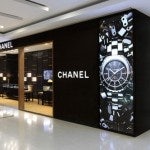
Chanel watch boutique, Beijing
Chanel Opens First Specialized Watch Boutique In China (July 8)
Chanel opened its first specialized watch boutique at the Beijing China World Shopping Mall. Designed by the New York architect Peter Marino, Chanel’s watch boutique follows the same general aesthetic of Chanel locations in New York and Tokyo. The comfortable and relaxing boutique offers the a full range of Chanel watches, including the classic Première series and traditional J12 series. Also included is a selection of limited-edition jewel-encrusted watches.
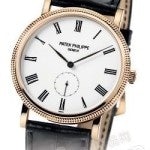
Patek Philippe was #1.
China’s 10 Favorite Luxury Watches (August 11)
Luxury watches are among the most lusted-after objects in the Chinese market, where they hold a particular sway over conspicuous consumption-obsessed buyers.China Daily, writing on the craze for Swiss watches that hasn’t diminished in China for the last 30 years, suggests, “ask any middle-class Chinese what would be his or her first luxury purchase and the answer will most likely be a Swiss watch.” Apparently a large number of these people aren’t just dreaming of buying a high-end watch, they’re actually doing it — even if they’re cutting back on basic necessities to save up for it. Last year, despite a 23% global drop in Swiss luxury watch sales, buyers in China accounted for a fifth of Swiss watch sales, and even that number is probably low considering the number of shoppers who purchased multiple watches on trips to Hong Kong or Europe.
Clearly Chinese consumers — along with their Middle Eastern counterparts — are a key market for the luxury watch industry, but looking at their specific “likes,” we can see what it is about these watch brands that appeals on a basic level to Chinese luxury lovers, whether they can afford them or not. This week, QQ Luxury posted a top 10 list of the watch brands most lusted-after by Chinese. Unsurprisingly, top brands like Patek Philippe and Omega feature high on the list, but as always there are a few interesting additions.
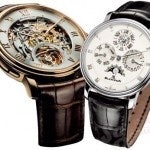
Blancpain and Patek Phillipe are among the most popular brands.
Hocked Luxury Watches Make The Good Times Roll At Beijing Pawnshops (September 15)
Aside from high-end European watchmakers or the recipients of “gifts,” some of the biggest beneficiaries of China’s luxury watch buying boom have arguably been humble pawnshops. In recent years, luxury watches have been the most commonly hocked good at Beijing pawnshops, with one watchmaker observing that the selling of these watches is now becoming “a financing channel for owners of small and medium enterprises.” As China Daily reported, luxury watches started to show up in pawnshops in Beijing in the mid-’90s, with pawning activity increasing dramatically since around 2000 and creating big business in the Chinese capital and some of the country’s wealthier cities.
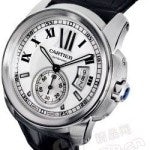
Cartier
Hong Kong, China Markets Keep Swiss Watch Industry “Ticking”…In More Ways Than One (October 7)
The Hong Kong and mainland China markets have consistently been some of the most lucrative for Swiss watchmakers, with Hong Kong becoming the world’s top individual market (with turnover of some $2 million in the first eight months of this year alone) and China moving into the top three national markets — behind only the U.S. and France — in the same time period. Following years of solid growth and sales figures in both Hong Kong and China, executives and retailers are rightfully bullish. In September, the CEO of the LVMH-owned watchmaker Hublot said that his company predicts “30 years of growth” in China, with “no limit during [his] lifetime,” and during the ongoing Golden Week holiday, Hong Kong retailers have been inundated with mainland buyers.
With demand remaining relatively stagnant in traditional markets like North America and Europe, China has become a prime driver of the Swiss luxury watch industry. But despite all appearances, this watch trade isn’t a one-way street. As Britain’sIndependent points out today, not only do China sales keep Swiss watchmakers “ticking” profit-wise, but these watchmakers increasingly depend on China and Hong Kong for components that keep the watches themselves ticking.

Chen Daoming © TAG Heuer
TAG Heuer Enlists Chinese Film Legend Chen Daoming As Brand Ambassador (October 28)
The seemingly insatiable demand for high-end watches has seen a flood of brands enter the Chinese market, despite relatively low customer brand recognition. As expected, as a result of low customer recognition, Chinese buyers have typically gravitated towards the most expensive watches, with Patek Philippe the most popular brand in China, followed by watchmakers like Vacheron Constantin, Cartier and Rolex.
In an effort to catch up to its Swiss rivals, TAG Heuer has made a massive push in the China market, building new flagships, unveiling a flashy ad campaign, and appointing a new Brand Ambassador known to virtually all of China’s 1.3+ billion people — the film legend Chen Daoming. In an effort to build brand recognition, TAG Heuer has dramatically increased its investment in the China market, making its spending there second only to the United States.
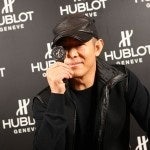
Jet Li at the opening of Hublot Beijing.
Hublot Fires Latest Salvo In Contentious Chinese Watch Market, Appoints Jet Li First Asian Brand Ambassador (December 1)
The Swiss brand Hublot upped the ante in the battle for the Chinese luxury watch market, opening its first flagship store in Beijing and appointing martial arts superstar Jet Li its newest China brand ambassador. With Chinese tourist-shoppers flooding Hong Kong, and many of them returning with bags filled with high-end watches — generally destined for friends, family, or “business partners” — it’s not terribly surprising that watch companies are looking to associate a familiar face with their products and set themselves apart in such a crowded market.
Although Montblanc and Omega recently jetted their brand ambassadors — Nicolas Cage and Nicole Kidman, respectively — in to China for lavish events, Chinese (technically Singaporean, in Jet Li’s case) stars are being appointed to do the job at an ever-increasing rate.
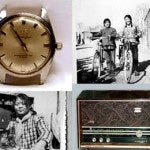
The "Four Big Things" during the Cultural Revolution.
“The Chinese Have Always Had A Weakness For Watches” (December 6)
From localized product lines and design partnerships with Chinese artists to star-studded events and the appointment of domestic brand ambassadors, major watchmakers have taken the extra step to cater to one of their most important (and loyal) markets. But a quick look at the history books indicates that China’s interest in timepieces stretches back to its imperial past, when Jesuit missionary Matteo Ricci first dazzled Ming Dynasty emperor Wanli with European clocks in the late 16th century.
In the centuries thereafter, though China adopted the Western 24-hour time standard in 1670, adoption of European-style clocks and watches remained largely restricted to the nobility. By the late 18th century, when the Qing Dynasty emperor Jiaqing banned the import of Western clocks and watches, China had developed a thriving indigenous watchmaking industry, though European pocket watches — and later wristwatches — remained popular among the country’s elite until the establishment of the People’s Republic in 1949.
From the 1950s to the late ’70s, Shanghai Watch emerged as the country’s dominant brand, and during the Cultural Revolution (1966-1976) a wristwatch had become one of the “Four Big Things,” (四大件) along with a bicycle, a sewing machine and a transistor radio, that were considered essential household items for newlyweds. But after the deaths of Mao Zedong and Zhou En’lai in 1976, and following the economic reforms ushered in by Deng Xiaoping just a few years later, Shanghai Watch and other domestic companies came to be seen by many of China’s freshly minted capitalists as relics. The age of the European luxury watch had truly arrived.